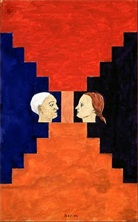| GMU |
| ICES |
| 2011 Summer Program |
| IFREE |
| What is Exp. Econ? |
Welcome...
In January 1956 Prof. Vernon Smith conducted his first experiment with a principles of microeconomics class because he believed there had to be a better way to teach economics. That experience lead him to further develop the experimental method as a tool to teach and research economics. He and many other pioneers in experimental economics quickly realized that the experiential process of learning by doing was the key to making complex economic principles comprehendible and fun. By participating in an economics experiment students experience firsthand that incentives matter and develop an appreciation for how and why market and other social institutions work the way they do.
.jpg)
With the generous support of the International Foundation for Research in Experimental Economics (IFREE), the Interdisciplinary Center for Economic Science advances learning by doing through experimental economics by
- Conducting workshops for graduate, undergraduate, and high school students,
- Developing software for using experimental economics in the classroom, and
- Holding seminars for policy and educational groups using a portable laboratory of hand-held computers.
Lionel Robbins in his 1932 Essay on the Nature and Significance of Economic Science defined economics as "the science which studies human behavior as a relationship between ends and scarce means which have alternative uses." Every year thousands of students are introduced to this widely accepted definition, or one very similar to it that drops the reference to "human behavior" and instead abstractly refers to "society" allocating scarce resources among unlimited wants.
Essentially, economics is taught as a theory of something that (generally) works in practice to students who wonder whether the theory is what is really working in practice. Economic experiments are an attempt to reintroduce human behavior to economics and assure the student that the theory of what we're teaching does appear to be at work in practice.
The drawback of this approach is that it diverts our attention to a shadow--quantities of goods moving from point A to point B (and instead of point C)--when the actual phenomenon of interest is the process by which real people exchange one thing for another. Our working definition of economics is the science of exchange among humans and the rules, formal or informal, that undergird it.
Thus, the study of economics covers impersonal exchange among strangers in markets; personal, social exchange among family, friends, and neighbors; and the systems of property rights (rights to act or not act) that support both. Experimental economics connects the theory that summarizes our observations on exchange to the everyday experience of the student.

In 2002 Vernon Smith was awarded the Nobel Prize in Economic Sciences.
Website Questions : |
George Mason University
Phone: 703.993.4850
Fax: 703.993.4851
Email: Dafina Mulaj